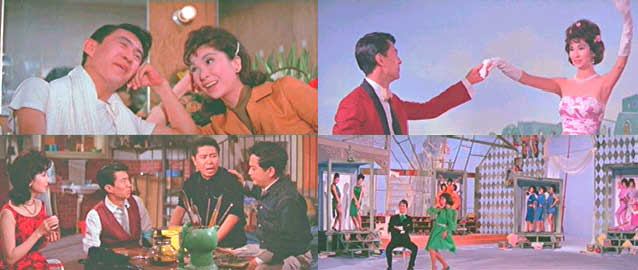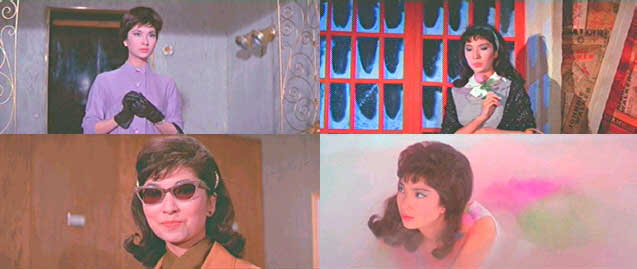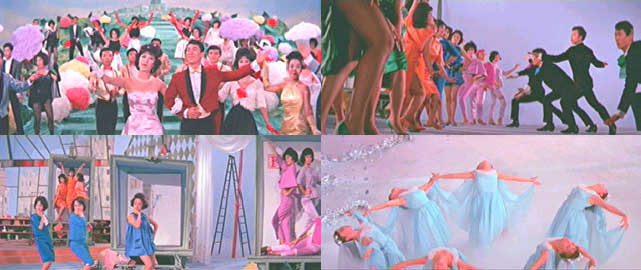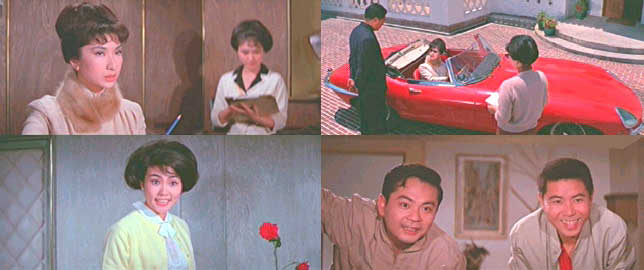The Dancing Millionairess

Director: Doe Ching
Year: 1964
Rating: 7.0
This rather charming
Shaw Brothers musical comedy squarely falls into that sub-genre that is commonly
referred to as “lets put on a show” in which a group of enthusiastic but
financially strapped people attempt to organize a show. Back in the 1940’s
this was exemplified by a number of Mickey Rooney/Judy Garland films. Here
the characters are a bit older but just as innocent and the proceedings are
very low key and amusing. Director Doe Chin (Love Parade, Calendar Girl,
Our Sister Hedy, Les Belles) seems to have a knack for light and sentimental
comedy that is quite appealing. His ability to stage a lively musical number
though is more questionable. Both Love Parade and this film suffer from the
same problems – though the musical numbers are lovely to look at, they just
have no energy and proceed at a turgid painterly pace.

But this film is really much more about the comedy than the music (the first
number doesn’t occur till the one-hour mark) and about the sweet chemistry
between Peter Chen and Betty Loh Tih. The two of them had married in 1962
and from the appearances of this film the love was still in full bloom when
this was made in 1964. So often when married couples are put together on
screen they generate the excitement of a night at home watching television,
but these two appear to have a light playful repartee that is enjoyable to
watch. Unfortunately, it was not to last and they were divorced by 1967.
Betty was to commit suicide in 1968 and Peter died of cancer two years later.

The film begins with Landi Chang finding a dropped wallet and roller-skating
after the man who lost it. He turns out to be a banker and she tries to get
him interested in investing in the musical show that her father (Cheung Kwong-chiu
– who also played the father in Hong Kong Nocturne) wants to put on. He seems
open to the idea, but the only catch is that he needs to get the loan approved
by his very tough lady boss (Betty). Meanwhile, Peter Chen, is being assisted
by his two roommates (King Hu and Li Kun) in getting prepared for an interview
for a job as a chauffeur to a very wealthy woman.

Prior to even meeting his potential employer, he blows the job but before
doing so the banker sees Peter with the car – which in the world of screwball
comedies is of course owned by his female boss. The banker naturally jumps
to the conclusion that Peter is having an affair with her and puts up the
money – the show is on! This misunderstanding is fine by Peter because
he really wants to be a dancer and this gives him the opportunity to be in
a show. Word is leaked to the newspapers about the affair and an angry Betty
Loh Tih storms down to the theater to confront Chen, but she is mistaken
as a journalist and in their conversation she begins to mellow under the
droll charms of Peter. By the end of it they are nearly melting in each other’s
presence.

It turns out she can dance and a sweet comedic romance of mixed identities
ensues. Though the music takes a long time to begin in the film, the final
twenty-minutes is a non-stop performance piece that is fun to watch in a
sort of glazed eye manner but again it is not very riveting. I enjoyed the
segment that seemed to be inspired by The Little Match Girl as Betty tries
to sell flowers in the cold winter – but how much more fun would it have
been if she had pulled out a machine gun and mowed everyone down as in Resurrection
of the Little Match Girl! Oddly, the 1969 Bollywood film “Sajan” has some
of the exact plot points as this film (with genders switched around), but
I am not sure if they took it from this film or whether both were based on
a Hollywood film (anyone know?).

Betty is quite wonderful here. She starts off as the ultimate efficient and
demanding boss – dressed in fashionable but formal attire – sitting at her
desk constantly punching the intercom to dictate instructions – a smile not
even remotely creeping onto her face – terrifying her staff with her cold
demeanor, but when love comes calling she goes all sweet and gooey as she
discovers how to have fun. She commands the screen whenever she is on it
and something about her presence just says, “star”.

Also, in the film are Julie Shih Yen as the very cute secretary – she is
Stephen Fung’s mother, Go Bo Shu as the major-domo of the household, Ku Feng
as one of Cheung Kwong-chiu’s friends and Ouyang Shafei as the aunt. The
biographical information on Landi Chang is somewhat interesting. She was
born in 1941 in Singapore into a circus family and she came to Hong Kong
in the early fifties as part of a circus troupe – explaining her excellent
roller-skating! She appeared in a number of films from the later fifties
to the late sixties when she married Kenneth Tsang and retired. They were
to divorce later on and she died in 1991. Though her part turns out to be
fairly small in the film, initially it appeared that it would be much bigger
and you feel a bit disappointed, as she is quite adorable.







